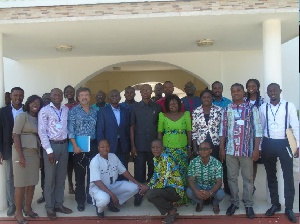The United States Agency for International Development (USAID) has organized a 3-week capacity building workshop for staff of the Ministry of Food and Agriculture (MoFA) in project planning, policy cycle and policy planning, monitoring and evaluation (M&E) as well as policy analysis. The workshop was held at the Institute of Statistical, Social and Economic Research (ISSER)-University of Ghana from April 18-May 24 2017.
Find below a Press Release from the workshop:
For Immediate Release
May 24, 2017 Phone: +233 577 706769 Email:aatengdem@agripolicyghana.org
PRESS RELEASE
Agriculture Policy Support Project
USAID strengthens the capacities of MoFA staff
Accra, GHANA–24th May, 2017: The United States Agency for International Development (USAID) has organized a 3-week capacity building workshop for staff of the Ministry of Food and Agriculture (MoFA) in project planning, policy cycle and policy planning, monitoring and evaluation (M&E) as well as policy analysis. The workshop was held at the Institute of Statistical, Social and Economic Research (ISSER)-University of Ghana from April 18-May 24 2017.
The 17 trainees were drawn from MoFA’s Policy Planning and Budget Directorate (PPBD), Agri-Business Unit, Project Coordination Unit and the Monitoring and Evaluation Directorate. Through its planning, budget and policy units, the PPBD’s mandate is to lead the technical processes for the development of policies, plans, programs and budgets of the Ministry, with a vision to coordinate and harmonize agricultural policy environment to help ensure increased agricultural growth and incomes. The broad mandate of the policy unit is to undertake rigorous agricultural policy analysis in order to promote evidence-based decision making.
However, due to lack of adequate resources and low staff capacity, the unit is unable to do this effectively. USAID, through its Agriculture Policy Support Project (APSP), is providing technical assistance to MoFA to strengthen the Policy Unit and other key units. It is working to improve the capacity of these units to conduct policy research and analyses; provide evidence for decision making; and develop periodic policy briefs on impacts of initiatives, programs, and projects in the sector for policy formulation. These skills will enable it to design appropriate policy interventions that promote agricultural growth and development in Ghana. This latest training is part of a comprehensive approach adopted by APSP to strengthen both the institutional and human capacities of the policy unit through staff training and provision of IT equipment and related software packages.
APSP, through ISSER, will continue to provide technical coaching of the trained staff to enhance their skills. The project will follow-up on their use of these analytical tools to carry out rigorous policy analyses to provide the Government of Ghana with technical analysis on impacts of macro-economic policies on the agricultural sector, analyze effects of agricultural policies, and facilitate the development of medium term, sectoral and sub sectoral objectives.
About APSP
The Agriculture Policy Support Project (APSP) is a five-year Feed the Future project, with the goal to improve the food security-enabling environment for private sector investment. The aim is to increase the capacity of the Government of Ghana, the private sector and civil society organizations to implement evidence-based policies, conduct research and advocacy and perform rigorous monitoring and evaluation of agriculture programs implemented under the Medium Term Agriculture Sector Investment Plan (METASIP).
About Feed the Future:
Feed the Future is the U.S. government’s global hunger and food security initiative. With a focus on smallholder farmers, particularly women, Feed the Future supports partner countries in developing their agriculture sectors to spur economic growth and trade that increase incomes and reduce hunger, poverty, and under-nutrition. For more information, visit www.feedthefuture.gov.
General News of Thursday, 25 May 2017
Source: USAID













